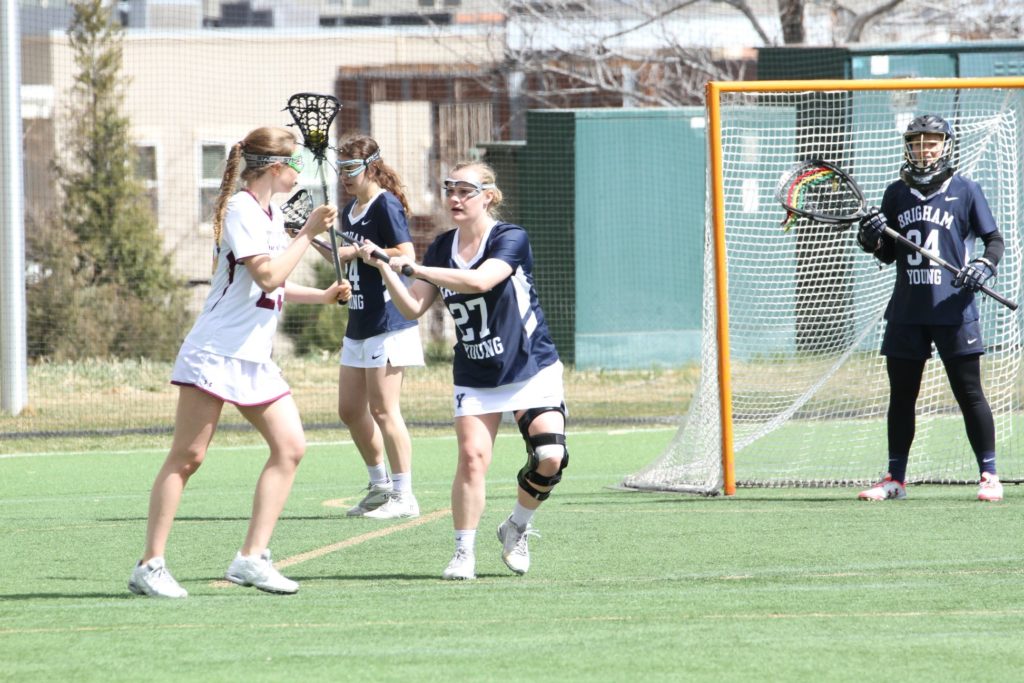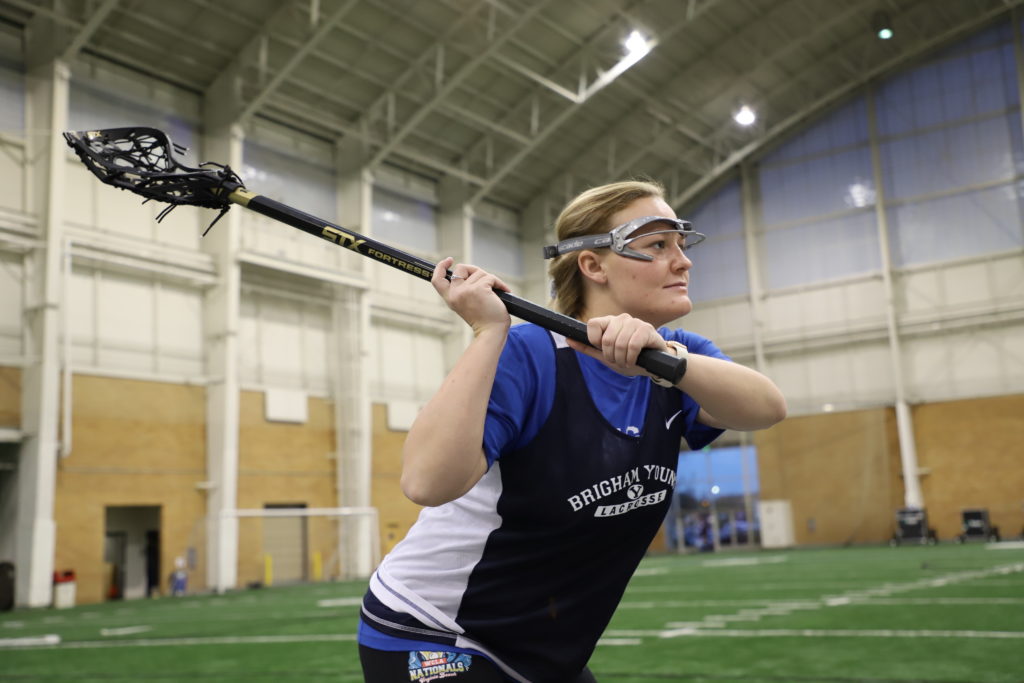The Haws family welcomed a little girl in March 1998 and named her Julia. The sport of lacrosse runs in the Haws family’s blood, and somehow, Julia always had a lacrosse stick in hand growing up. Her mother, Nancy, gave her the nickname “The Bruised and Broken.”

Brad, Julia’s father, played lacrosse at BYU in the 1980s while attending graduate school. He later worked with some friends to start the Utah high school lacrosse program. Both of Julia’s parents coached at high schools in Salt Lake County when Julia was younger, and she often watched from the sidelines.
They later moved to Charlottesville, Va., where her parents continued coaching at the high school level. They coached their own kids on club teams and at clinics. They lived right next to the University of Virginia where they went to men’s and women’s lacrosse games regularly. Nancy later coached at Southern Virginia University for about 5 years.
“We were very active in the (lacrosse) community,” Julia said.
Lacrosse is a family tradition — a tradition that has kept the family active, to say the least. Like her family, Julia has played sports all her life, even though they have caused her many injuries. One of her first injuries was a dislocated shoulder from playing basketball. On top of that, she suffered several concussions. During her junior year, Julia was out of high school from February to June because of an injury.
She didn’t give up, working consistently through her quiet character. Her mother, Nancy, said she is is not only amazed that Julia is still playing, but impressed that she is competing at a high level collegiately.

The injury bug followed Julia to BYU, as she suffered her first knee injury during her freshman year at nationals in 2017.
It happened on the second day during the second game against Pittsburgh. BYU was losing in the second half when a player was bringing the ball downfield after a turnover. The player was headed toward Julia.
“As I was turning to run with her, her knee went into the outside of my left knee so my knee turned inside, and I heard a pop,” Julia recalled.
It was a pop that she said was completely different from anything she had experienced. She was later told by medical professionals that it was an ACL injury.
Julia didn’t let the injury deter her. She rehabilitated her left knee during the summer and most of her sophomore year. Doctors told her she needed to regain her range of motion and the muscle lost from her knee.
Julia said physical therapy was a frustrating journey because she was in constant pain. John Stutznegger, the team’s athletic trainer, lead Julia’s rehab efforts. He describes her trust in the process as the trust of “the little engine that could.”

Nancy said she doesn’t wonder if she should let her daughter continue to play, as that would dampen her daughter’s passion. Instead, Nancy focuses on how the family can support her.
Julia remembered an impactful moment in her journey when she was able to run after four long months of rehab. She was able to see the chance of playing again in the near future, and little-by-little, she began to play.
“I know one of the causes of re-tearing is playing scared that you’ll tear it again, so I tried to trust my months and months of rehab and the strength so I wouldn’t worry about it,” Julia said.
Julia contemplated redshirting her sophomore season, but in the end, she said she couldn’t help but play. She threw a brace on the knee and regained her starting position on the defense. The team needed her presence as they went back to nationals. finishing second overall, the best the program has ever finished. However, it wasn’t the best for Julia’s left knee.
Intense pain came to the same knee that Julia had surgery on earlier that year. Julia remembered feeling more pain in her knee when she lifted weights, specifically squatting. Pain persisted while Julia, health professionals and family members tried to identify the problem.

That wasn’t going to stop Julia. She played most of her junior year even when she would come off the field in tears from the excruciating pain she felt. Finally, an X-ray was done and the doctor said it was probably a screw that was placed in her knee during the surgery that was causing her pain.
It’s not common to get a screw removed from a surgery like this one. This would mean another surgery with a six-week recovery or various pain management routes to stick through the season and deal with it after. Julia and her family decided to have another surgery to take out the loose screw. A short 20-minute surgery was all that she needed.
“After a couple days, I went on the elliptical and had no pain anywhere. It was the greatest feeling” Julia said.
The six weeks of recovery was hard on her, but it was for the best, she said. It was also an opportunity to build relationships with teammates off the field.
Haws came back mid-March in time to gain a spot at nationals again for the third time in her career at BYU. A tough loss in the semi-final matchup against Delaware in Virginia Beach, three hours from home, brought her junior season to an end. Fifth place wasn’t exactly what she wanted, but some good came from the week.
“I finally felt healthy; I finally felt like I had my knee back,” Julia said.

Julia is a captain in her senior season, and her knee is finally healthy. Kim Meacham, one of her teammates, said she loves playing defense with Julia because she knows she can count on Julia to give it her all.
“It’s obvious her love for the sport, because when she hits the field, she doesn’t stop working until she is better than before,” Meachem said.
Her love and commitment for the game hasn’t changed since she was on the sidelines of her parent’s games.
“Our identities were in lacrosse our whole life,” Julia’s sister Jordan said.
Julie’s injuries have not stopped her but instead acted as detours that have brought her back stronger than before. Rather than complaining about it, Julia continues striving to be better each day, working quietly and consistently.




